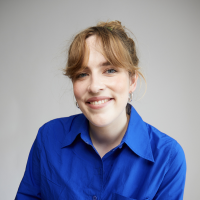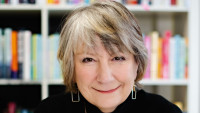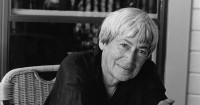
New Literary Agent Listing: Rosie Pierce
firstwriter.com – Tuesday June 4, 2024

I read widely and across genres, and I am looking for both literary and commercial fiction. I love family dramas, ghost and horror stories, psychological suspense, murder mysteries, gripping thrillers, and big-hearted romantic comedies. In storytelling I am most often drawn to distinctive, original voices; vivid characterisation and world building; confident, engaging prose; and astute social observation. I particularly love to read about the relationships that shape - or even define - a life. I am looking for expansive, character-driven novels that explore complicated family dynamics, enduring friendships, love affairs, coming of age, the best and worst things we do for love. I am also always keen to read novels that explore occultism, séances, the uncanny, dark academia, and thrillers with emotional punch and nail-biting plot. And if a novel can make me laugh, I am sold. In non-fiction, I'd love to hear from writers who bring their expertise and/or experiences to the page in an accessible, compelling and original way. I am looking for narrative non-fiction, memoir, and books exploring pop and celebrity culture, alternative histories, psychology, the internet.

The surprising joys of independent publishing
thebookseller.com – Monday June 3, 2024

Publishing non-fiction is a tricky beast. I should know, I’ve written five non-fiction books to date with different publishers across the board: Ebury, Transworld, Hodder & Stoughton and each experience has been very different. While I’ve had great experiences (a Sunday Times Business Bestseller, Apple’s "best book of the month", UK book tours, guest curating at Cheltenham Literary Festival, multiple appearances at Hay Festival and other “badges of honour”) I’ve been left wondering if there might a different way to get my zeitgeist non-fiction writing out there. Non-fiction is famously hard to sell (requiring authors to have "a platform") and the books often include timely topics that rely on tapping into a cultural moment. I’ve been thinking: in a world of newsletters and zines — is publishing a traditional big hardback non-fiction book always the best way to spread your idea? I am not so sure anymore.
My Substack newsletter, The Hyphen, has really taken off over the last couple of years and has attracted over 50,000 engaged readers, meaning that I can publish my articles and essays with a click of a button, directly reaching my readers. There is a paid subscription model for any supporters of my work who want to access my hub of over 100+ articles. Even though it’s more about building the community than "scaling" financially or otherwise, I recently made the equivalent of a previous non-fiction book advance in a single month on Substack.

Why Are Debut Novels Failing to Launch?
esquire.com – Thursday May 30, 2024

For first-time writers, it’s harder than ever to break out. That poses an existential crisis for publishing—and disturbing limits on your access to exciting new voices.
On the Road was not Jack Kerouac’s first novel, but you’d be forgiven for thinking as much.
Though 1957’s On the Road is widely considered to be Kerouac’s “debut,” the author’s first novel, The Town and the City, was in fact published in 1950. By all measures, it flopped. Between that book and the launch of On the Road, Kerouac started working with the literary agent Sterling Lord, who believed he could be the voice of his generation and laid the groundwork for his public reception as such. What, exactly, did Sterling Lord do to prime Kerouac’s audience? From 1953 to 1957, he leveraged his own professional connections to place excerpts of On the Road in magazines like The Paris Review and New World Writing, building hype for the young novelist’s next book. This is common practice today, but in the fifties, it was a novel solution to the name-recognition problem faced by unknown writers.
After a few years of seeing Kerouac’s byline in print, the thinking went, readers would pay attention when they recognized his name on the cover of On the Road. It was one of the first literary “debuts” of its kind, explains Temple University professor Laura McGrath, author of the forthcoming book Middlemen: Literary Agents and the Making of Contemporary American Literature. McGrath argues that Sterling Lord created the blueprint for the literary “debut” phenomenon we still see today.

How a Self-Published Book Broke ‘All the Rules’ and Became a Best Seller
nytimes.com – Thursday May 30, 2024

Keila Shaheen’s “The Shadow Work Journal” shows how radically book sales and marketing have been changed by TikTok.
Last summer, a book changed Kohn Glay’s life.
A TikTok ad had steered him to “The Shadow Work Journal,” a slim workbook that directs readers to explore hidden parts of their unconscious — their shadow selves, in the book’s vernacular. He ordered a copy, and soon was back on TikTok, fervently recommending it to his followers.
“If you’re on your spiritual journey, you absolutely need to go and get you one of these,” he says in the video, urging viewers to buy the book in the TikTok store.
The video went viral, eventually drawing more than 58 million views. Glay, who is 43 and lives in Baltimore, began holding online classes to guide people through the journal. Over the next few months, people who watched his videos bought more than 40,000 copies of the book on TikTok, and Glay earned more than $150,000 in commissions. By December, he had quit his job as a sales representative for Home Depot and now runs his own business, “Happy Healin,” which offers subscribers spiritual mentorship and coaching through Zoom sessions.

Penguin seeks out emerging talent in science fiction and fantasy through WriteNow
herald.wales – Thursday May 30, 2024

ASPIRING authors have until Sunday 16th June to submit their story ideas for this year’s WriteNow programme, which will focus exclusively on science fiction and fantasy.
WriteNow, Penguin Books’ award-winning programme to seek out, nurture and publish new under-represented voices has opened applications for the 2024/2025 cohort. Focusing on science fiction and fantasy, the programme is looking to find exciting new writers from across the UK and Ireland.
Aspiring authors can apply to take part in this year’s programme by submitting a short synopsis and 1,000 words of sample writing by Sunday 16th June. Entries will be judged by editors across Penguin Random House with the longlist contacted by Friday 12th July.
WriteNow is designed to give writers from under-represented backgrounds the skills, knowledge, and access needed to navigate the industry and build a successful writing career. Since its launch in 2016, 20 authors to have come through the programme have been published by a Penguin Random House imprint, including: Beth Lincoln, author of New York Times bestseller The Swifts, and Manjeet Mann, author of The Crossing, winner of the Costa Children’s Book Award.

Jo Unwin to leave publishing for new career
thebookseller.com – Wednesday May 29, 2024

Literary agent Jo Unwin is leaving the Jo Unwin Literary Agency (JULA) and starting a new career outside publishing.
Unwin, who founded JULA in 2013, has discovered and championed new voices throughout her career. She has helped establish prizewinners such as Candice Carty-Williams and Kit de Waal, and to have worked with Booker Prize nominees Gabriel Krauze and Stephen Kelman, as well as bestsellers such as Emma Flint, A J Pearce and Jenny Colgan.
Her non-fiction authors range from Charlie Brooker and Philomena Cunk to Richard Ayoade, the poet Brian Bilston along with children’s authors such as Sarah Moore Fitzgerald and Nadia Shireen.

Why do books have chapters? How writing changed from antiquity to children's books and streaming
abc.net.au – Sunday May 26, 2024

Nicholas Dames remembers the first time he really got thinking about a very obvious but largely invisible writing device.
It was around two decades ago, when he was completing a PhD in English and American literature.
"A friend of mine, who was not an academic, over drinks one night, just blurted out to me, 'why do novels have chapters?'," the Columbia University humanities professor tells ABC RN's Late Night Live.
"I realised I hadn't the faintest clue how to answer that question. It was one of those, 'why is the sky blue' questions."
In the years that followed, Professor Dames returned to this question again and again, so he decided to explore the history of the chapter.
The topic may sound deeply academic, but it's not all laborious details about medieval tomes.
At the heart of this history is how we tell stories.
And from a child's development to an evening on the couch watching Netflix, the chapter affects our lives in many unnoticed ways.

Ursula K. Le Guin on How to Become a Writer
lithub.com – Saturday May 25, 2024

How do you become a writer? Answer: you write.
It’s amazing how much resentment and disgust and evasion this answer can arouse. Even among writers, believe me. It is one of those Horrible Truths one would rather not face.
The most frequent evasive tactic is for the would-be writer to say, But before I have anything to say, I must get experience.
Well, yes; if you want to be a journalist. But I don’t know anything about journalism, I’m talking about fiction. And of course fiction is made out of experience, your whole life from infancy on, everything you’ve thought and done and seen and read and dreamed. But experience isn’t something you go and get—it’s a gift, and the only prerequisite for receiving it is that you be open to it. A closed soul can have the most immense adventures, go through a civil war or a trip to the moon, and have nothing to show for all that “experience”; whereas the open soul can do wonders with nothing. I invite you to meditate on a pair of sisters. Emily and Charlotte. Their life experience was an isolated vicarage in a small, dreary English village, a couple of bad years at a girls’ school, another year or two in Brussels, which is surely the dullest city in all Europe, and a lot of housework. Out of that seething mass of raw, vital, brutal, gutsy Experience they made two of the greatest novels ever written: Jane Eyre and Wuthering Heights.

New Literary Agent Listing: Jess Molloy
firstwriter.com – Monday May 20, 2024

I read broadly across fiction and narrative non-fiction. I am usually first pulled in by a unique concept or setting, but what keeps me reading are beautifully drawn, complex characters, relationships, and family dynamics. I enjoy reading fantasy and romance and I am particularly on the lookout for a story which has a slow burn at its heart, full of angst and drama. I have a deep love for Irish fiction both in terms of Irish writers, and novels set in Ireland. I enjoy crime fiction and true crime writing that subverts the genre and focuses on the victim or the fallout for their family. In terms of non-fiction, I enjoy issues led narrative writing with a personal story at its heart and particularly love hearing from underrepresented voices. I am also interested in psychology and therapy. My non-fiction reading varies broadly from comedians to experts and journalists, but what I am always looking for is an authentic voice that will teach me something fascinating or share a very personal journey with me.
Our Interactions in This Business
By G. Miki Hayden
Instructor at Writer's Digest University online and private writing coach
firstwriter.com – Sunday May 19, 2024
At the heart of much of what we accomplish in this life, very much including how well we do as writers, lies how we conduct our relationships, knowingly or unknowingly.
For instance, I’m pretty sure my neighbor is annoyed with me. From time to time I’ll edit a piece of writing for him, as I did recently. I don’t charge him anything, but he will sometime thereafter take me to lunch. Generally, we’re on quite good terms, but what he sent me this last time had a tone that I didn’t think was his, and the way the material was phrased I felt was unwise. Yet the letter—that’s what the note was—made me bristle. The intent was to let a government entity know that the group requesting some action had a distinct amount of power and had better be listened to.
Get the free newsletter | Submit a news item or article | Get Writers' News for your website





